I was in Tokyo recently for the 8th edition of Japan’s largest retail cosmetics trade show: Cosme Tokyo 2020 took place from 20th-22nd January at Makuhari Messe. The trade fair had relocated from Tokyo Big Sight exhibition centre to Makuhari in Chiba prefectures a few years ago – in 2021, however, Cosme Tokyo will return to Tokyo Big Sight.
Anyway, Makuhari Messe is around 40 minutes by local train from Tokyo Station – i.e. good transport connections if you’re staying in the Chiyoda area. I had booked my hotel in Kanda (one stop away from Tokyo Station) so my daily commute to the trade show was very manageable.
And, as always, Cosme Tokyo was very much worth a visit. At the 2020 fair, some 900 exhibitors from 35 countries presented their new launches across two key trade show sections: Cosme Tech for OEM/ODM, ingredients and manufacturing and Cosme Tokyo for finished cosmetics.
There were also smaller sections for Inner Beauty (supplements and health foods foods) and Lifestyle & Wellness products. My own focus was Cosme Tokyo with a brief excursion into Inner Beauty – nutritional supplements and functional foods are an important (and absolutely fascinating) FMCG category in Japan.
What I like about Cosme Tokyo is that it’s such a domestic trade fair: the majority of exhibitors are from Japan and as a result the trade fair offers an accurate reflection of current trends within the Japanese personal care market.
Spoiler alert: most of this year’s key trends continued on from last year’s show – natural and organic ingredients and products were much in evidence, as were typically Japanese ingredients (such as collagen, placenta, horse oil, rice bran oil, sake lees et. al.), and brand/product positioning which highlighted the “made in Japan” factor.
Cosme Tokyo was also chock-full with new and exciting cosmetics brands and this is one of my favourite things about visiting trade fairs: the opportunity to check out the local indie beauty situation. These small companies rarely have the financial means (or company infrastructure) to attend the big pan-Asian or international trade shows, so the only way to find out what’s happening in the Japanese, Korean or Chinese indie beauty scene is to attend the respective country’s regional trade fairs.
So, without further ado: here’s a list of some of my favourite brand discoveries at Cosme Tokyo 2020, starting, of course, with the host country!
Cosme Tokyo 2020: Beauty from Japan
EDOBIO (Japan)
Newcomer brand Edobio was launched in 2019 with a small but pretty range of skin care products, namely the Ukiyo-e Soaps (solid cleansing bars in packaging inspired by traditional Japanese wood-cuts (ukiyo-e)) and a matching serum. A new interpretation of classic Japanese beauty ingredients and skin care rituals; you get the drift : )
The products are based on traditional Japanese ingredients with a strong natural/clean beauty positioning; I’d imagine that the company’s target demographics will be international tourists visiting Japan. Edo is the old name for Tokyo while Bio, well, refers to the natural character of the ingredients. While the products are by no means organic the INCI declaration looks pretty clean and the brand’s positioning and marketing is totally on point.
Products are sold through the brand’s online shop, in selected luxury hotels in Japan and in some Tokyu Hands stores; the Edobio website also lists Japanese department store retailer Isetan as the brand’s retailer in Kuala Lumpur, Malaysia.
At Cosme Tokyo 2020, Edobio presented its latest product launches, the Floradiance Moisturizing Soufflé Soap which is available in two versions, plain and premium. You can see the luxury edition in the pics above: the soap is packaged in a traditional Japanese wooden sake cup which is made from hinoki (Japanese cypress) wood and the pack also includes a soap-beating net. Also new in the range are two loose-leaf tea blend: a green tea (for morning time) and a herbal tisane to be enjoyed at night.
RICE BRAN OIL (Japan)
The company behind recently launched skin care range Rice Bran Oil is a rice distributor, Akafuji, which decided to branch out into beauty last year: Rice Bran Oil brand was introduced in 2019 and offers a 12-sku product range.
The line-up comprises four face care products – including lip balm sticks, a buttery multi-purpose moistiúriser and a face oil – as well as four moisturising body oils and three bar soaps. Because Rice Bran Oil is still so new on the market its products are mostly sold online, but I was told that the brand also has a small store in Tokyo’s Omotesando neighbourhood.
SILK LIFE LAB (Japan)
The history of Silk Life Lab is quite similar to that of Rice Bran Oil: the company behind silk beauty brand Silk Life Lab is actually a silk kimono manufacturer from Niigata prefecture. The company – I’m not sure what the Romaji version of its Japanese name is; the website address is Kimono-Brain and there also seems to be a subsidiary in Vietnam (“KB Vietnam”) so let’s stick with Kimono Brain for the moment!
Anyway, Kimono Brain raises its own silk worms and the silk extract that is the key active in the brand’s is manufactured from the discarded silk worm pods. In 2019 the company decided to launch a beauty range, the afore-mentioned Silk Life Lab: six skin care products, including a hydrating skin lotion, an essence, a hair and body shampoo and a bar soap.
The pack design is simply and rather stylish, texture are very pleasant and light and the product fragrance is barely there, kind of a non-scent.The products are mostly sold online but the company is also hoping to move into offline retail at some point.
IKKO (Japan)
Japanese horse oil brand Ikko is not exactly new on the market (manufacturer Ikko Kagaku has been around for years) but two of the products in the line-up of the Ikko Premium range are: the Balancing Lotion and the Smooth Touch Gel.
Horse oil is an enormously popular ingredient in Asian beauty (horse oil is also called “mayu”) and despite the slightly sinister name, it is not pressed from live horses or anything – horse oil is a by-product of the horse-meat industry (a nose-to-tail approach, so to speak – and yes, pun fully intended!). I’m very fond of horse oil myself, it’s an excellent emollient and protective ingredient.
And I just love the pack design of this range! (less the full-cheeked Caucasian baby which appears on some of the visuals, but the horse galopping past the snow-covered Mount Fuji… !)
BOTANICFOLK (Japan)
Botanicfolk is the prettiest little beauty brand: launched in 2019 with a 20-odd product range which includes three flower-infused multi-purpose skin care oils that can be used on face, hair or body. There are als matching nail oils packaged in elegant roll-ons, four moisturising body oils, three oil-based UV protection hand serums and three hand creams as well as several perfumes.
Most of the flacons feature fragments of petals or herbs suspended in the liquids which looks really attractive. Because Botanicfolk is still a new brand most of its sales are still online but the brand’s website also lists an impressive range of domestic offline POS, including selected Tokyu Hands stores, Lumine department stores and Atré malls.
SARA (Japan)
The first thing I noticed about Japanese beauty brand Sara’s exhibition booth at Cosme Tokyo was the big halal certification seal on the booth banners – yes, Sara is yet another new Japanese niche brand that’s invested in a halal certification!
Incidentally, the booth of vegan and halal certified makeup brand Shojin Cosme (I first met them at Cosmoprof Asia 2019; check out my trade show article for more details!) was more or less vis à vis from Sara, so these two companies almost formed a halal beauty competence cluster.
Anyway, just like Shojin Cosme, Sara’s founder is leveraging the power of J-Beauty internationally by focussing on retail possibilities beyond the domestic market: I was told that from April onwards, Sara’s new Premium All-In-One Serum will be sold in dermo clinics in Malaysia (one of the largest halal beauty markets in Asia). [If you’re wondering why part of the product’s name – Vy Krásný Sara – is neither Japanese nor English; well, the founder liked the Czech phrase for “you’re beautiful” and incorporated it into her brand’s name].
NATURE’S WAY (Japan)
Meeting cosmetics company Nature’s Way was such a highlight for me: not only are they a true organic beauty pioneer (they’ve been manufacturing natural cosmetics since 1974) but they are also the company behind one of my favourite Japanese organic brands, Chant-a-Charm (launched in 2011). I used Chant-a-Charm’s Moisturising Lotion just this morning! Incidentally, I was told that the brand will introduce a carbonated foam serum in April which sounds intriguing!
Other high-profile Nature’s Way beauty brands include mineral makeup brand Naturaglacé (which was launched in 2008), salon beauty brand Biolab (2001) and Sanders Perry which has a complicated brand history: originally a UK brand from the 1940s but since 1974 production’s been taking place in Japan; with the current Sanders Perry affiliate company founded in 2004). And Herb Labo is the company’s OEM/private label business.
Nature’s Way also manufactures German beauty brand Weleda’s Japanese products . In fact, I just consulted the company brochure’s time line and Nature’s Way became Weleda’s Japanese distributor in 1976. In 1999 the company launched an affiliate, Weleda Japan, and they’ve been creating the Japanese Weleda products ever since. Like the Edelweiss SPF Cream – the Japanese version of this sun protection cream is so much better in terms of texture and wearability than the German Edelweiss SPF cream.
Nature’s Way also runs a 3,850 sq m organic farm in Yamanashi prefecture where the company cultivates and harvests many of the ingredients used in their beauty products and in 2019 the company became the exclusive distributor for US brand Dr. Bronner’s. Oh, and the fabulous Beauty Library organic beauty concept store in Tokyo’s Aoyama/Omotesando neighbourhood – that’s also Nature’s Way.
YUMICO (Japan)
Japanese makeup brand Yumico was another interesting brand discovery at Cosme Tokyo 2020. This charming little makeup brand was launched in 2017 by makeup artist (or, as she calls herself: makeup therapist) Rieko Tomita.
The line-up comprises 18 powder eyeshadows, eight powder blushers and refillable compacts each of which offers space for six powder shadows or a blusher and two eyeshadows. I like refillable palettes (I love refillable anything, actually; you should see the collection of tiny refillable skin care containers that I travel with!) and the Yumico products looks very stylish. The products are primarily sold online at the moment but the company is hoping to expand into offline distribution soon.
AIRARE BAI CHA (Japan)
Check out the gorgeous product design in the pictures below! This is Japanese salon manufacturer Wave Corporation‘s new Airare Bai Chai skin care range, a millennial-geared unisex spa brand which offers six ultra stylish face care products (the packaging was created by renowned Japanese fashion designer Kazuki Kuraishi).
The key ingredient in Airare is White tea and the line-up comprises a cleansing foam, a cleansing water, a liquidy moisturising milk, a clear moisturising lotion, a facial essence and a rinse-off face mask.
At the moment Airare is primarily sold online but the company is expecting to expand into offline retail as well – and considering that Wave Corporation is a major domestic salon manufacturer this will probably happen sooner rather than later. I could totally see Airare’s product design in Loft stores, for example : )
BRO.FOR MEN (Japan)
Men’s care is a growing category in Japan although the market continues to be dominated by the big men’s care players, such as Bioré and Gatsby, with a focus on skin care, hair care, styling and colourants and some shaving preps. You know, traditional men’s care stuff.
Over the past few years, however, the category has been expanding, with younger and more urban/millennial-geared product ranges moving in – Japanese skin care brand DHC, for example, started to extend its men’s care offering with more lifestyle-oriented beauty products last year. Then there are the new stylish men’s beauty brands that have been appearing on the market in recent years. (J-beauty brand Bulk Homme is probably the most high-profile example of this new generation of male grooming labels).
At Cosme Tokyo 2020 I came across an attractive looking men’s care brand and must admit that I initially thought Bro.For Men was from Korea – in my defence, the first items that I saw were foot bubble masks and nipple covers and these are the kind of trend products that I tend to associate with Korean men’s beauty rather than Japanese cosmetics : )
Anyway, Bro.for Men was launched in December 2019 with an 8-sku range of products packaged in super stylish black and white. The line-up includes the aforementioned Foot Bubble Packs (formulated with baking soda for a natural exfoliating effect) and the Nip Cover Sheets (so you can wear close-fitting business shirts without embarassment!) but also a liquid body cleanser, a moisturising gel, a face lifting mask (this is a chin mask, really; with ear hooks that secure the mask to your face), a Beard Shade Concealer (a concealer stick to hide beard shadows or impurities) and a lip balm.
Products are priced at around 2,000 Yen (approx. 18 Euro) which means that this range is situated in the masstige segment; distribution is mostly online at the moment but I was told that starting in February, the product range will be sold in Loft concept stores across Japan. Should be a perfect match, this is such a Loft brand!
Cosme Tokyo 2020: Hemp wellness
The international CBD (cannabidiol) trend also made a tentative appearance at the trade show this year although most of the products were found at the exhibition booths of international companies: Japan’s regulations for the manufacturing and import of cannabidiol and hemp ingredients/products are very strict indeed.
Brief excursus on CBD and Asia: Most Asian and South East Asian countries tend to view CBD and hemp-based products with great suspicion (to put it mildly): CBD and its derivatives – even if they’re medicinal and/or THC-free (tetrahydrocannabinol, the psychoactive substance in cannabis sativa) – are frequently lumped together with illegal drugs/controlled substances and, well, depending on which country you travel in (this applies especially to South East Asia), repercussions can range from fines over deportation all the way to incarceration and risk of death penalty. Even for foreigners.
In Japan, using and owning cannabis is illegal and punisheable by heavy fines and/or imprisonment (which also applies to medicinal cannabidiol-based products). This also means that marketing hemp-products (even if they are THC free) to the average Japanese customer is a bit of an uphill battle. At least at the moment.
I saw around half a dozen hemp brands at the trade fair, mostly from the US (like Grön) and Europe, but there were also a couple of Japanese exhibitors that presented CBD supplements.
ORANGE CBD (Japan)
Orange CBD caught my eye because this Japanese supplement brand advertises hemp-free CBD. Yes really! I was told that parent company Hiro International initially tried to manufacture “normal” hemp-based CBD products but after they ran into problems with the strict regulatory framework that governs hemp and CBD production in Japan, the company decided to go another route.
The active ingredient in Orange CBD (a liquid supplement) offers a effect that’s claimed to be similar to what you’d get from hemp CBD. However, instead of hemp the key ingredient is based on a certain type of terpene that’s found in orange peels. I don’t know enough about the composition of orange peel essential oils to confirm or deny this (I’m also not sure if there are scientific studies to support the brand’s claim) but – well, it’s actually a rather ingenious way of avoiding the possible stigma associated with hemp and/or CBD usage.
Orange CBD is still very new on the market (I don’t even know if they have a domestic online store yet) and the company was obviously at the trade show to test the waters, so to speak.
ATARACIA (Japan)
Unlike Orange CBD, Ataracia is an actual CBD brand (i.e. with hemp-derived CBD) and they were launched last year.
The product portfolio is compact and centers on offer four different CBD oils in different concentrations. There are also three skin care products (a sheet mask, an all-purpose moisturising cream for the entire family and an Athlete’s Cream for sore muscles) and honey-lemon flavoured CBD candies.
I was told that Ataracia’s products are manufactured in the US to avoid the difficult regulatory situation in Japan, with the exception of the CBD candy which is hand-produced in Kyoto. When I asked about the brand’s distribution channels I was told that the products are primarily sold online (no surprise there) but of course the company is also trying to move into offline retail. I’ll keep my fingers crossed for them!
Cosme Tokyo 2020: Beauty from Korea
DOWN PERM FOR MEN (Korea)
This is such a fun product! Men’s grooming brand Gentler’s new Down Perm for Men is an at-home perm kit for men – more specifically: for men with medium-length hair which has reached the stage of growth where the hair tips start to look messy. The Down Perm promises to tame these recalcitrant hair tips so your hair looks straight and tidy, for a well-groomed look especially along the hair line.
The kit contains the pre-mixed perm solution which is packaged in a pen-shaped applicator, protective plastic sleeves for the ears, a hair clip and perm paper sheets.
And this is how it works: slip on the plastic ear covers, click the button on the bottom part of the pen to release the perm liquid and apply it to the hair tips. Stick the perm sheets onto the moistened hair ends (so the hair stays, well, down) and wait for 5-15 minutes. Then remove the perm papers, rinse out the hair and style as usual.
SUPERFOOD FOR SKIN (Korea)
I do enjoy the packaging design of Korean beauty brand Superfood for Skin; it’s fun, colourful and always on point. This is Farmskin’s latest launch: The Mix it! Clay Mask packs look exactly like instant cup noodles!
There are four different variants in the range, all are based on clay powder blended with different fruit and vegetable extracts. I also liked the watermelon-inspired pack design of the Fresh Food for Skin Moisturizing Aqua Facial Emulsion – the outer cardboard sleeve looks like a watermelon rind and the bottle is clad in the juiciest-looking watermelon red!
FINIORGANICS (Korea)
This was a rather surprising discovery: Finiorganics is a natural skin and body care brand that’s manuufactured in Korea for international distribution, especially in the US market (the products aren’t available in Korea at all). I stopped at the booth because the gorgeous packaging of the makeup range caught my eye; then I discovered the skin care range with its quirky and colourful product design.
The brand’s skin and body care range comprises some 100 sku, I was told, which are sold through US retailers Sally Beauty and Whole Foods. The benefit of international distribution means an English-language INCI declaration and from what I could see most of the products are pretty organic, even by our European standards.
Finiorganics’ makeup range offers five liquid lip colours with strong pigmentation, ten lipsticks and two cushion foundation. I was told that the products are vegan (didn’t see a certification, but then again I was in a rush and didn’t have much time to investigate).
Whatever the circumstances, Finiorganics is a really interesting looking brand. Having said that, their social media presence is pretty much non-existent, at least at first Google.
Cosme Tokyo 2020: Taiwanese excellence
NAVEEN (Taiwan)
It’s always a pleasure meeting up with Taiwanese organic beauty brand Naveen at the various Asian and European trade shows that we both attend – founder Karen Kung always has some exciting new products to present. At Cosme Tokyo 2020, Naveen showcased its new 3-sku range of baby products: the Babies & Kids Sunscreen, the Soothing Chest Rub and a Soothing Tummy Rub.
Naveen is just one of the certified organic beauty brands produced by Karen’s company Evergoods. In 2014 Evergoods became the first Cosmos-certified organic beauty manufacturer in Taiwan; their production facility is based in the country’s capital city Taipei. As far as I’m aware the company is still the only certified organic C&T manufacturer in Taiwan.
Besides its own ranges Naveen (Evergoods’ international/export brand) and La Vie Naturelle (a domestic brand available only in Taiwan) Evergoods also has a flourishing OEM/ODM business (if you come across Cosmos-certified organic products that are made in Taiwan, chances are that they are from the Evergoods factory).
Cosme Tokyo 2020: Indie beauty from Canada
I was very excited to meet Canadian exhibitors Pura Botanicals, Wild Prairie Soap and My Daughter Fragrances. Last March I had received a generous press sample package which included products from all three Edmonton/Alberta-based artisan beauty brands.
I liked the cosmetics very much indeed – the products of all three brands are organic, very high-quality and hand-crafted in small batches, with a focus on Canadian-sourced ingredients – so it was a special treat to be able to meet the founders in person.
PURA BOTANICALS (Canada)
Let’s start with high-end skin care brand Pura Botanicals: founded by Lane Edwards in 2012 with an extensive portfolio of anti-ageing and spa-inspired face care products, stylish packaging and, yes, excellent product quality.
In the picture below you can see the company’s latest launch, from December 2019: the Hyaluronic Ruby Serum which is based on aloe vera leaf juice, vitamin C, niacinamide, bilberry and cucumber extracts and hyaluronic acid. The texture is wonderful – the serum is a rose-scented gel which is absorbed almost immediately into the skin – and the flacon contains a small piece of actual ruby. Soon the company will also launch refills for the serum so you can keep the original bottle.
And there’ll be more exciting new arrivals this year, such as the moisturising Azure Dream Cream which is formulated with aloe vera leaf juice, coconut oil, avocado oil and squalane and the active ingredients vitamin C, blue tansy extract and yuzu oil.
Dreamsicle Hand Oil is a moisturising yet very light-textures oil for hands and nails (scented with a wonderful blend of orange essential oil, rosewoood and vanilla notes) and there’ll also be a line of moisturising fragrance oil roll-ons (the flacons contain different precious stones which have been selected to match the fragrance).
If you want to check out the brand in more detail, Pura Botanicals is already available in a few international markets, including the US and Hong Kong and, most recently, in France (through online retailer Creaminal Beauty).
WILD PRAIRIE SOAP (Canada)
This artisan beauty company started manufacturing bar soap in 2002 and soon moved into into other bath and body care categories: Wild Prairie Soap’s line-up offers fizzy bath bombs, body scrubs, liquid hand and body washes, lip balms and – one of their latest launches – the solid body lotion bars that you can see them in the pic below.
The brand has a solid distribution across Alberta and most of Canada and last year they even entered the Japanese market – Wild Prairie Soaps’ lotion bars are now available in various domestic retail chains, including Tokyu Hands, Loft and Ainz & Tulpe. And there are more new products in the pipeline: I was told that soon the company will introduce a solid dishwashing bar. Interesting!
MY DAUGHTER FRAGRANCE (Canada)
Artisan fragrance brand My Daughter Fragrance was launched in 2013/14 and in the picture above you can see their latest product: Lavender Bunny is a soft and silky body oil based on jojoba and meadow foam seed oils and scented with notes of lavender and vanilla (incidentally one of my favourite fragrance combinations ever!). Lavender Bunny and its companion product Petal Crush were launched last month.
Brand founder Janey Ganson sources most of her ingredients from France; the blending, filtering, bottling and all the rest of it is then done manually in the company’s production facility outside of Alberta’s capital city Edmonton.
My Daughter Fragrance’s first scent was Joyful (which I also have at home): an aromatic, sweet and fresh blend of white blossoms, citrus and sandalwood – I love wearing it. The press parcel from last March also included a flacon of Mandarine & Frankincense, the first offering in a new herbals-led perfume range and as much as I like Joyful: if I had to chose between the two fragrances I think I’d select Mandarine & Frankincense – I adore frankincense and in this perfume the aromatic resin is blended with bitter orange notes and a dash of pink pepper. It’s a beautifully harmonious blend.
Anyway, if you want to find out more about the brand’s fragrances check out the company’s website; the perfumes are sold in spas, boutiques and niche stores in Canada and the US (not yet in Europe, unfortunately, but fingers crossed My Daughter Fragrance will also be available over here at some point!).
I’ll leave you with some more images from the trade show. Thanks for reading!


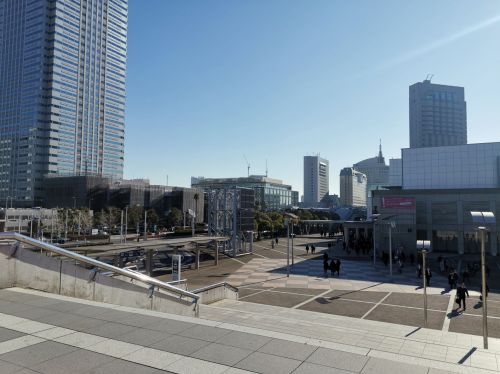

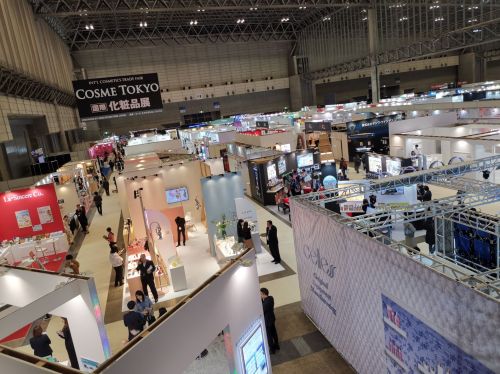

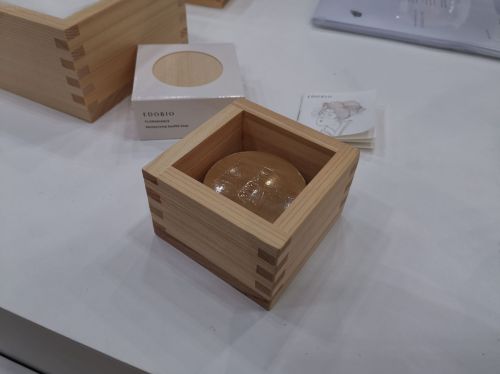
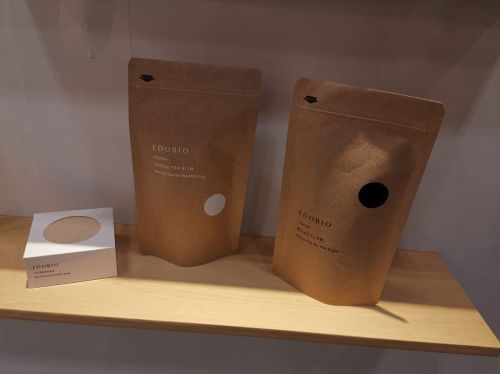
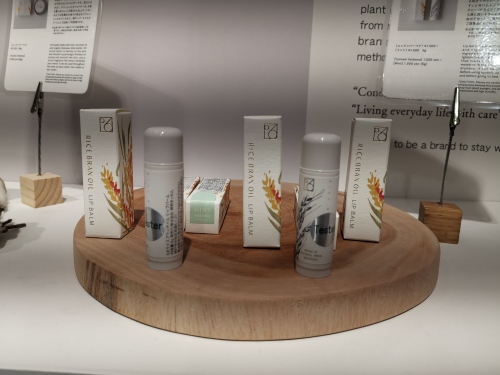
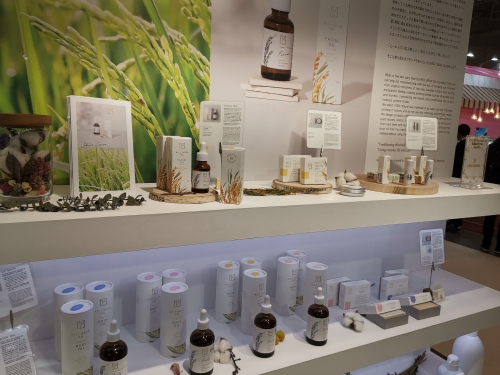
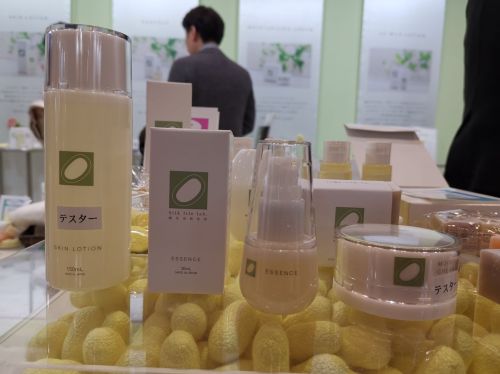
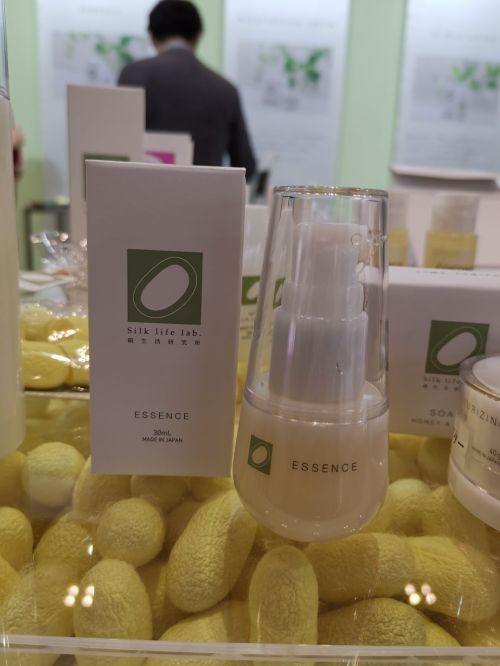

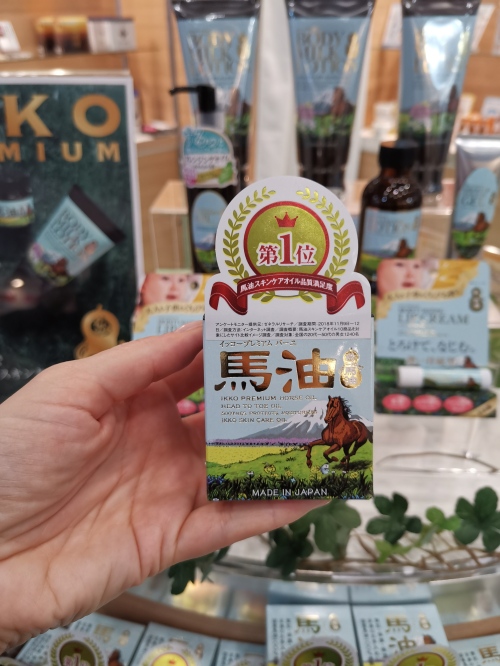
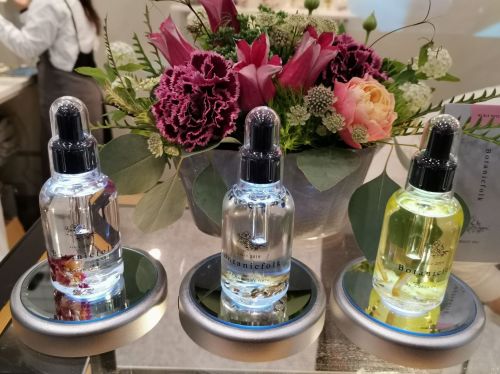
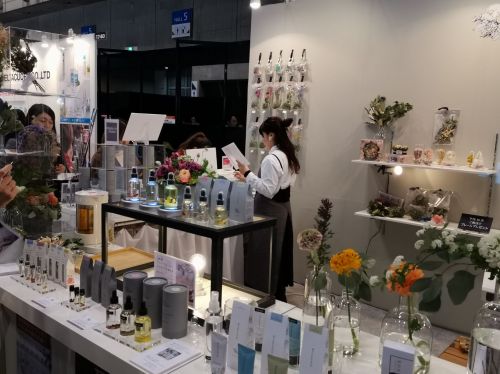
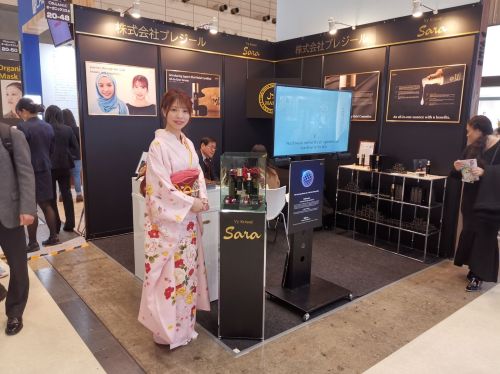


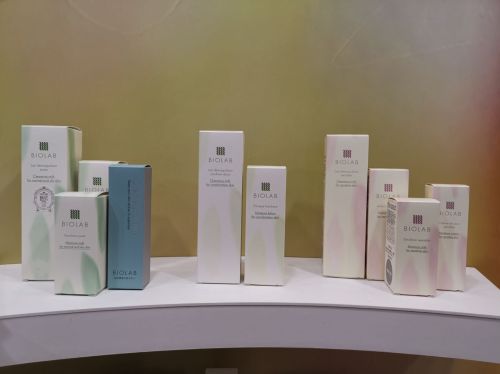
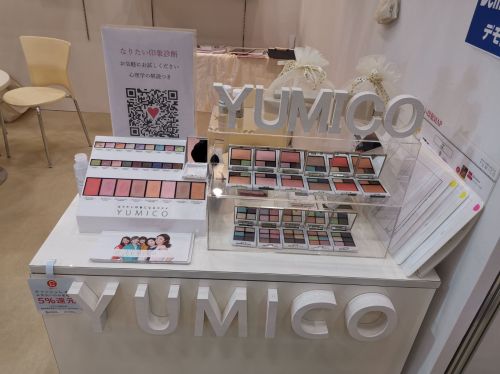
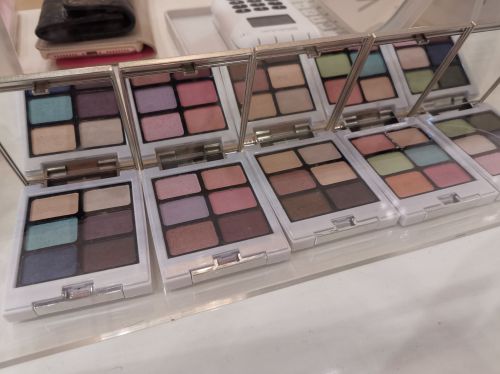
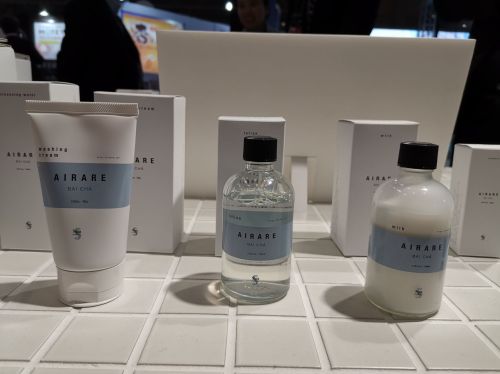

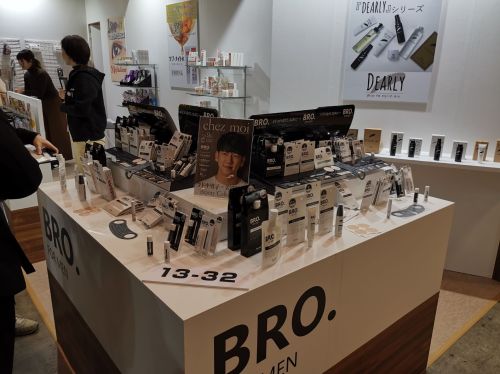

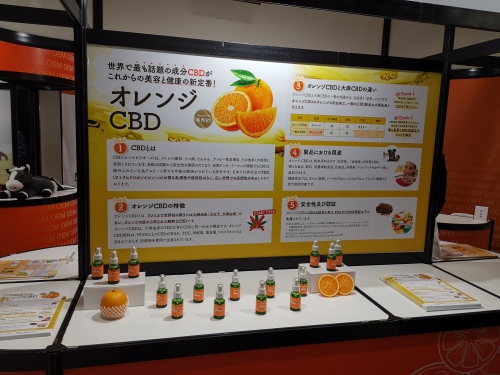
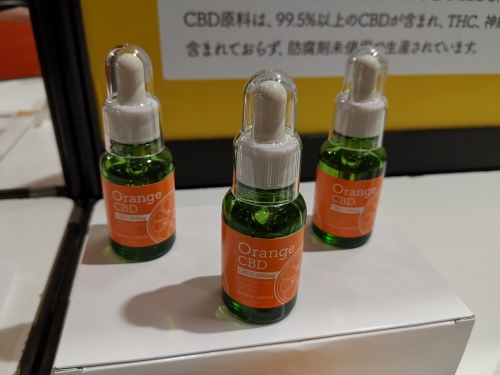
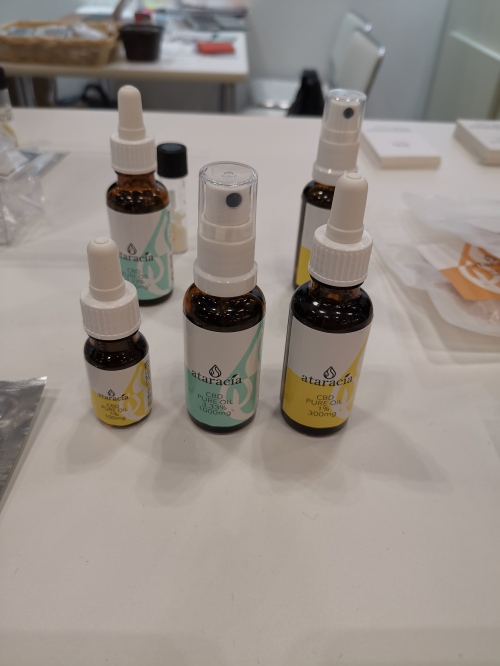
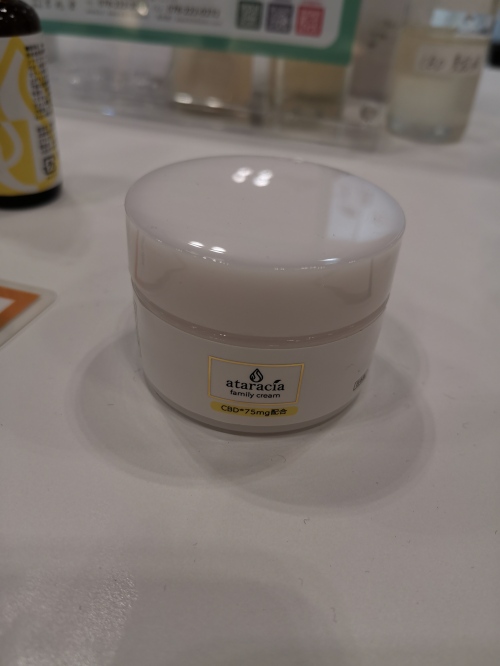
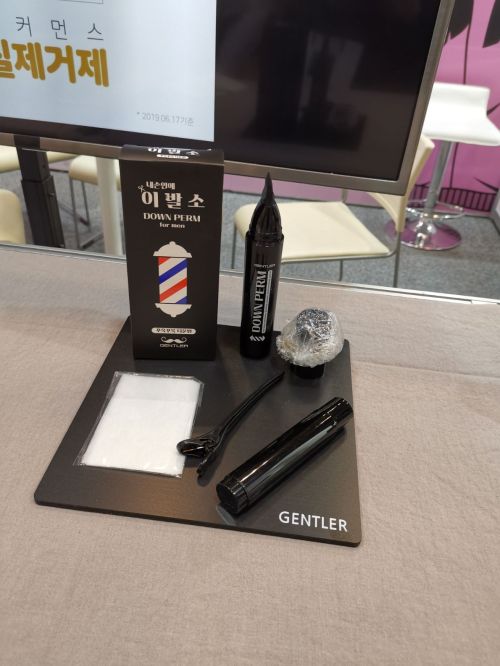

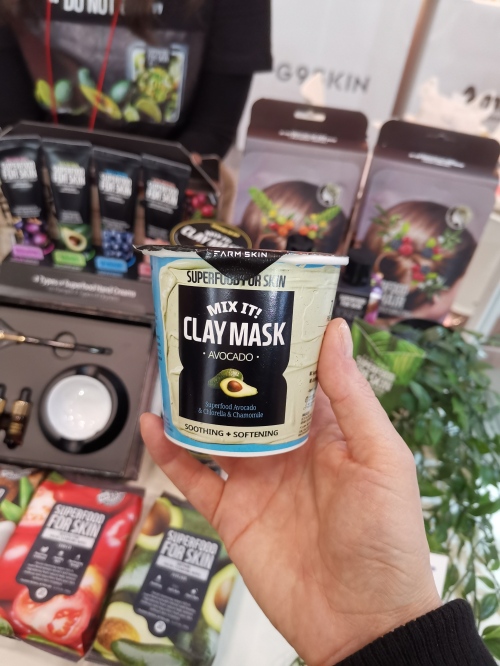
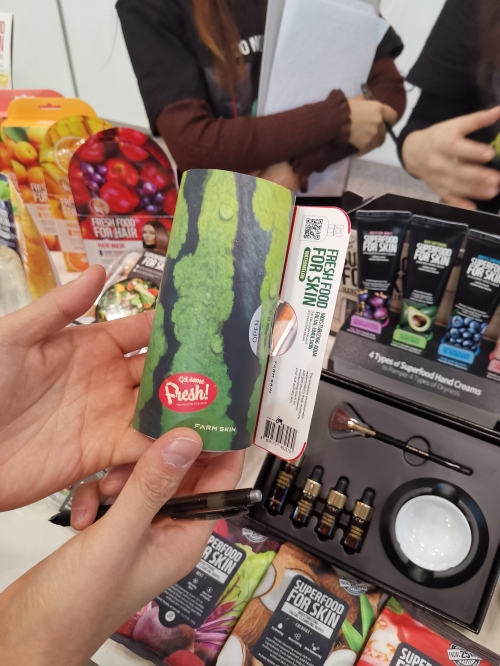

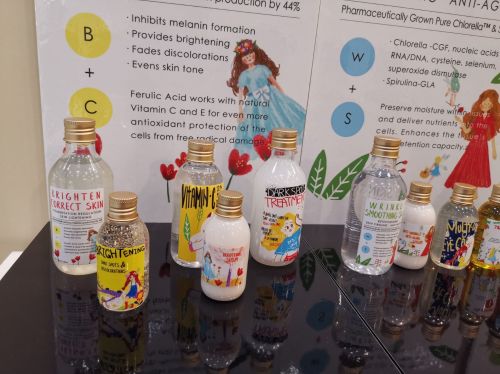

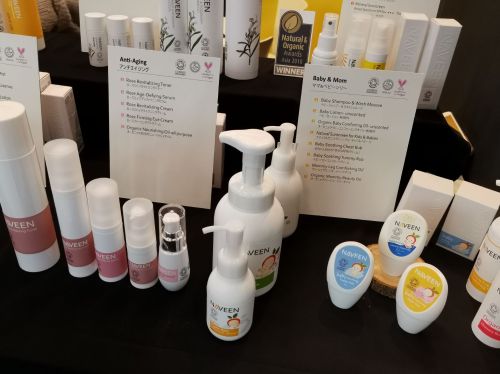
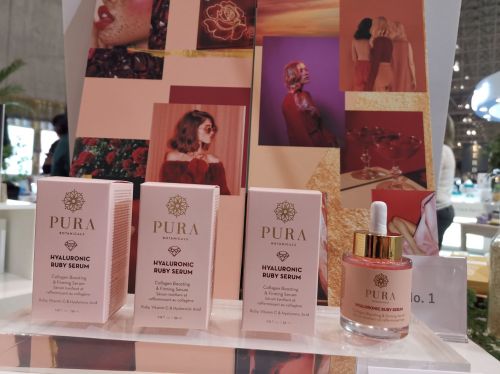
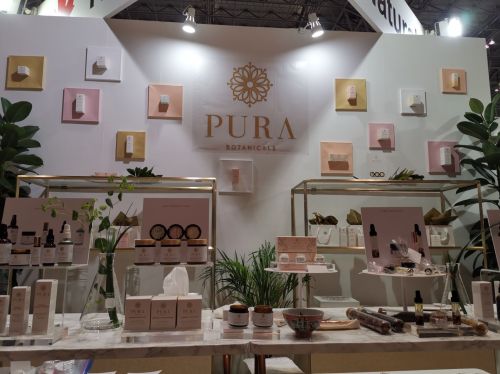
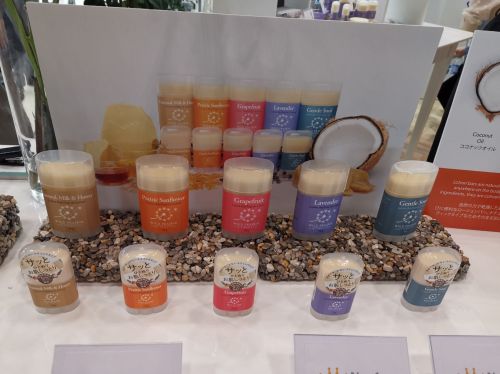
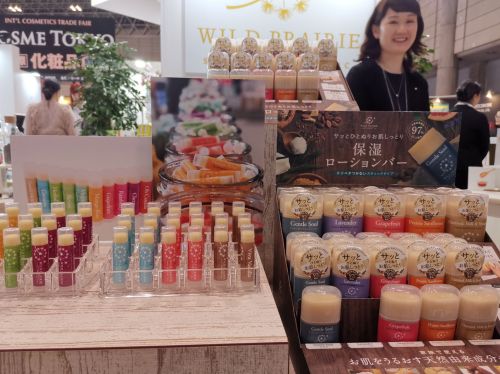
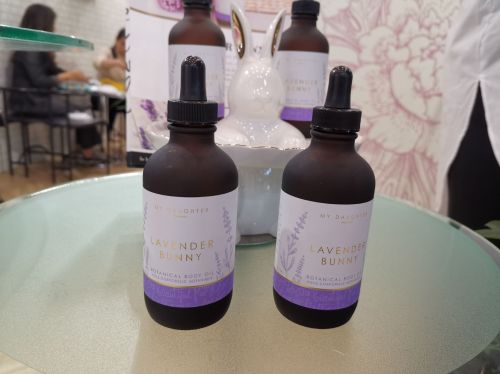
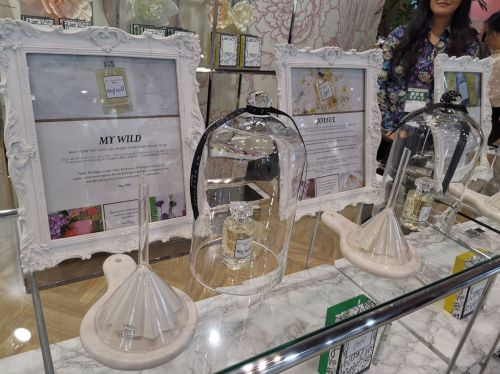
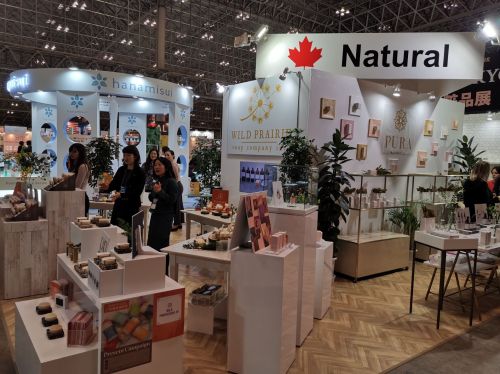
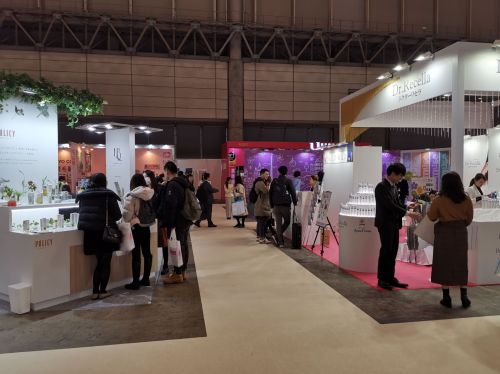
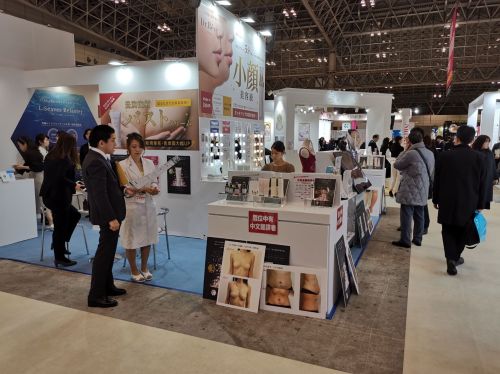
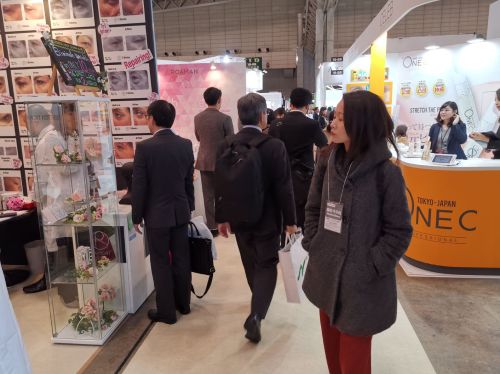
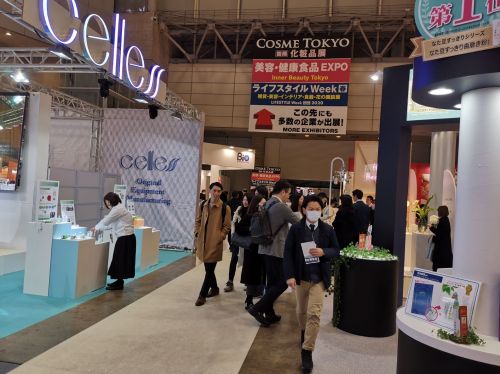

Pingback: Cosme Tokyo 2021: [Show Report] | TRENDS. TRAVELS. AND BERLIN
Pingback: Cosme Tokyo 2022: [Show Report] | TRENDS. TRAVELS. AND BERLIN
Pingback: Retail notes from Tokyo: [Show Report] Cosme Tokyo 2023 | TRENDS. TRAVELS. AND BERLIN
Hi there
I am Patricia, founder of a Spanish beauty brand.
I am trying to find any Tokyo Indie beauty store with brands from Europe an USA, could you help me?
Thank u
Hi Patricia,
you can check out Cosme Kitchen (https://www.cosmekitchen-webstore.jp/), the biggest and best-known organic beauty retail chain in Japan. They sell many European and Western beauty brands. Their Japanese site doesn’t have an English language version but I always use Google Translate which works well.
Good luck!
Best wishes,
Annie
Pingback: Cosme Tokyo 2024: [Show Report] | TRENDS. TRAVELS. AND BERLIN